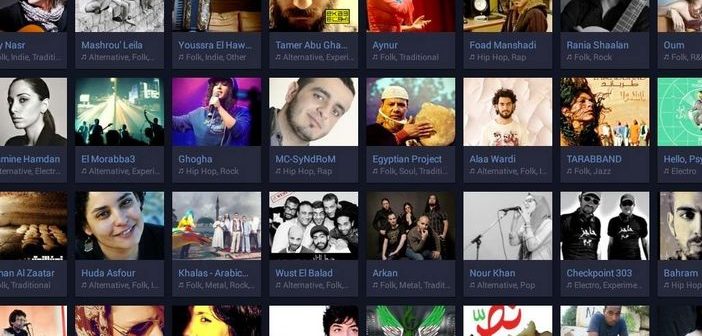Many artists from Lebanon, Egypt, Jordan and beyond mostly work online. There have even been ‘only-online’ artists who later transposed their art into the ‘real world’. Especially for countries where there is no real infrastructure for releasing independent music and art, the internet offers them a great deal of tools to spread, share, and distribute their work, thus they build their own infrastructure.
Lebanese multi-artist Zeid Hamdan, who is a pioneer in the independent scene and has shaped the sound and noise of Beirut for the past decade, has already an impressive list to offer that includes bands such as Soapkills with Yasmine Hamdan, or The New Government. He released most of his work online, especially with his platform Lebanese Underground. What makes this website interesting is that “most of the artists featured on this interface are independent, Lebanese underground doesn’t sign exclusive contracts with the artists featured on this website”. Talking to Zeid Hamdan back at the Berlin Premiere of Yallah! Underground that portrays the underground music scene in the region, directed by Farid Eslam, he tells me that “we just work on the internet”.
Maii Waleed, another Egyptian singer-songwriter, who also participated in the film, tells me that “since the revolution, people have realized the power of the internet, and since then we have seen a lot of artists, independent musicians, who produce music from their home studios and put it out there”. The majority of artists who are part of this movement, are mostly releasing their work for free on Soundcloud, Bandcamp and other platforms, making it accessible for everyone who is interested in their work.
Lebanese artist and composer Karim Douady affirms that, as long as it is possible, he wants to release his own creative music for free. Many of these artists, therefore, use the internet not only as a tool to be present on the online scene but for many of the local artists of the region it is sometimes the only way to produce and release music without having to overcome many financial hurdles.
This new form of distributing music and the way how artists built their own infrastructure online has been part of a network of research concentrating on the music underground and independent scene and can be described as part of the digital media metamorphosis making the production of music easier. In the book Local Music Scenes and Globalization, Transnational Platforms in Beirut, music-ethnologist Thomas Burkhalter discusses how “the new democratic means of production and distribution manage to change power relations between musicians and markets”.
This new digital media metamorphosis between artists and their distribution of music has been taken more seriously in the last decade with new platforms emerging on the scene that help artists to find a more diverse fan base, which is not only confined to their local scene, thus making local music more global. One of these platforms is MidEast Tunes, which features not only a space to introduce artists to a new audience, but through their radio program and their blog, they give the audience a context and characterization of the artists featured on the platform. MidEast Tunes was established in 2010 by Bahraini civil activist Esra’a Al-Shafei. MidEast Tunes emerged as one of the most reliable sources on discovering new artists and musicians from the region. Without such platforms as MidEast Tunes many artists would not have been discovered. The goal of MidEast Tunes is to “bridge barriers of faith and geography and to unite people committed to fostering constructive discourse in the region through music”.
Thus, their slogan is “Music for Social Change” and it currently hosts 1807 artists from the region. The importance of such a platform is obvious. Not only does it create an invaluable archive of musicians and artists who have been socially, politically and economically influential during the last decade, but for the artists it opens a way to communicate with each other and to have a space to create partnerships. You can filter between countries and genres. Egypt shows a result of over 302 artists, while from Lebanon there are 156, from Jordan 88, Syria 69 and Tunisia 65 artists. Of course, these numbers do not reflect the reality. Probably more artists and musicians exist without having a profile on platforms such as MidEast Tunes.
But these options give you an idea about the proportion of artists in each country. Concerning genres, Hip Hop shows a result of 424 artists, Rock of 319, Metal of 320 and Electro of 214 artists, but, of course, artists overlap and usually don’t confine themselves to only one genre. Even though genuine and important labels exist in Lebanon and Egypt, such as Ruptured and 100Copies, those labels struggle to maintain their sustainability. This is why most of the small bands are relying only on online releases. For example, the Cairo band Ta7t El Sefr (Beneath Zero), which emerged back in 2014, released its self-titled debut album only on SoundCloud last year. The album itself is a journey of personal issues with a Pink Floyd-esque sound attached. The democratization of distributing the work of artists reached an unprecedented peak in recent decades, and especially for young artists such as Ta7t El-Sefr it is an important tool to optimize their fan base. Therefore, being digital means to have the freedom to distribute music independently in a raw and personal way without worrying over sound and contract issues that may deviate from the artists’ own point of view. It helps them to build a network of their own, of like-minded artists to create the sound they want, and it helps them to create a new narrative absent from the mainstream sound of someone like Amr Diab.
By creating this new online infrastructure, which has been fostered by activists, artists, and like-minded people who believe in the underground scene of the region, a symbiosis of giving and taking is formed. While artists have to rely on their fan base to achieve their goal in continuing to make art in a political, social, cultural and sometimes sarcastic way, the audience relies on the artists in order to have their art available without many restrictions. This helps to sustain the alternative infrastructure created by these different platforms such as MidEast Tunes in symbiosis with Soundcloud. Other Social Media are also helping artists with little means to create a platform where to perform their music without being dependent on too many contradictions.
On MidEast Tunes, the artists don’t have a contract, because, in Es’ras words, they have “their own sign up button on the site. They simply complete their profiles and add their bios, photos, videos, tracks, and any other information and we verify the band in the backend to ensure that it’s legitimate.”
Later on she states in an interview with hypebot.com from last year that “we’re here to make meaningful, powerful, and often underrated music available in ways it otherwise wouldn’t be, and we’re a non-profit. Currently, there’s no other organization in the region doing this on our scale”.
Thus MidEast Tunes creates a new “digital media metamorphosis” between distributors and consumers making local music, globally accessible.





